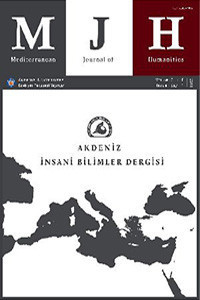Özel Eğitim Merkezlerinde Çalışan Öğretmenlerin Mesleki Yetkinlik ve Tükenmişlik Düzeyleri Arasındaki İlişkinin Belirlenmesi
Abstract
Özel eğitim alanında okul öncesi eğitim öğretmeni, görme, konuşma, işitme, zihinsel engeli vb. alan-larda uzmanlaşmış özel eğitim öğretmenleri, psikolog ya da psikolojik danışman ve fizyoterapist gibi farklı meslek grupları bir arada çalışmaktadır. Özel eğitim merkezlerinde çalışan öğretmenlerin birçok nedenden dolayı mesleki yetkinliklerinde azalma olmakta, daha fazla mesleki tükenmişlik görülmektedir. Bu araş-tırmanın amacı da, özel eğitim merkezlerinde çalışan personelden öğretmenlerin mesleki yetkinlik düzeyleri ile mesleki tükenmişlik düzeylerini belirlemek ve mesleki yetkinlikleri ile mesleki tükenmişlikleri arasındaki ilişkiyi incelemektir. Araştırmada genel tarama yöntemlerinden ilişkisel tarama modeli kullanılmıştır. Araştırma, Ankara İlinde bulunan özel eğitim merkezlerinde çalışan öğretmenlerden çalışmaya gönüllü katılmak isteyen okul öncesi eğitim öğretmenleri, işitme, zihinsel ve görme engelliler öğretmenleri (318 öğretmen) ile yürütülmüştür. Araştırmada verileri toplamak amacıyla “Kişisel Bilgi Formu, Öğretmen Mesleki Yetkinlik Ölçeği (ÖMYÖ) ve Öğretmen Mesleki Tükenmişlik Ölçeği (ÖMTÖ)” kullanılmıştır. Araştırmanın sonunda öğretmen mesleki yetkinlik ve mesleki tükenmiş ölçeği puanları ile her iki ölçeğin tüm alt boyutlarında istatistiksel olarak anlamlı bir ilişki bulunmuştur. Öğretmenlerin mesleki yetkinliği ve mesleki tükenmişlikleri arasında negatif yönde ilişki olduğu belirlenmiştir.
References
- Abell M. M., Bauder D. K. & Simmons T. J. (2005). “Access to the General Curriculum: A Curriculum and Instruction Perspective for Educators”. Intervention in School and Clinic 41/2 (2005) 82-86.
- Akten S. (2007). Rehber Öğretmenlerin Mesleki Tükenmişlik Düzeylerinin İncelenmesi. Yüksek Lisans Tezi. Trakya Üniversitesi, Sosyal Bilimler Enstitüsü. Edirne 2007.
- Almog O. & Shechtman Z. (2007). “Teachers' Democratic an Defficacy Beliefs and Styles of Coping With Behavioural Problems of Pupils With Special Needs”. European Journal of Special Needs Education 22/2 (2007) 115-129. Doi: 10.1080/08856250701267774.
- Andreassen R. & Braten I. (2013). “Teachers’ Source Evaluation Self-Efficacy Predicts Their Use of Relevant Source Features When Evaluating ohe Trust Worthiness of Web Sources on Special Education”. British Journal of Educational Technology 44/5 (2013) 821-836. Doi:10.1111/j.1467-8535.2012.01366.
- Bandura A. (1977). “Self-Efficacy: Toward a Unifying Theory of Behavioral Change”. Psychological Review 84/2 (1977) 191-215.
- Bandura A. (1989a). “Social Cognitive Theory”. Ed. R. Vasta. Annals of child development, 6, Six theories of child development (1989) 1-60. Greenwich.
- Bandura A. (1989b). “Regulation of Cognitive Processes Through Perceived Self-Efficacy”. Developmental Psychology 25/5 (1989) 729-735.
- Baran G., Bıçakçı M. Y., İnci F., Öngör M., Ceran A. & Atar G. (2010). “Analysis of Burnout Levels of Teacher”. Procedia Social and Behavioral Sciences 9 (2010) 975-980. Doi:10.1016/j.sbspro. 2010.12.270.
- Betoret F. D. (2009) “Self-Efficacy, School Resources, Job Stressors and Burnout Among Spanish Primary And Secondary School Teachers: A Structural Equation Approach”. Educational Psychology: An International Journal of Experimental Educational Psychology 29/1 (2009) 45-68. Doi: 10.1080/01443410802459234.
- Biglan A., Layton G. L., Jones L. B., Hankins M. & Rusby J. C. (2013). “The Value of Workshops on Psychological Flexibility for Early Childhood Special Education Staff”. Topics Early Childhood Special Education 32/4 (2013), Doi: 10.1177/0271121411425191. Billingsley B. S. & Cross L. H. (1991). “Teachers’ Decisionsto Transfer from Special to General to General Education”. The Journal of Special Education 24/4 (1991) 496-511.
- Brouwers A., Evers W. J. G. & Tomic W. (2001). “Self-Efficacy in Eliciting Social Support and Burnout Among Secondary-School Teachers”. Journal of Applied Social Psychology 31 (2001) 1474-1491.
- Chan D. W. (2005). “Teacher Self-Efficacy Research and Teacher Education”. Educational Research Journal 20/2 (2005) 149-164.
- Cherniss C. (1995). “Stress, Burnout, and the Special Services Provider”. Special Services in the Schools 2/1 (1995) 45-61. Doi: 10.1300/J008v02n01_04.
- Çapri B. (2013). “Tükenmişlik Ölçeği-Kısa Formu ile Eş Tükenmişlik Ölçeği-Kısa Formu’nun Türkçe Uyarlaması ve Psikoanalitik-Varoluşçu Bakış Açısından Mesleki ve Eş Tükenmişlik İlişkisi”. Kuram ve Uygulamada Eğitim Bilimleri 13/3 (2013) 1393-1418. Doi: 10.12738/estp.2013.3.1576.
- Davis K. C. & Palladino J. M. (2011). “Compassion Fatigue Among Secondary Special Education Teachers: A Case Study About Job Stres and Burnout”. Online Submission Eric Number: ED522807.
- Dembo M. H. & Gibson S. (1985). “Teachers’ Sense of Efficacy: An Important Factor in School Improvement”. The Elementary School Journal 86/2 (1985) 173-184. Kaynak: http://www.jstor.org/ stable/1001201
- Embich J. L. (2001). “The Relationship of Secondary Special Education Teachers’ Roles and Factors That Lead to Professional Burnout”. The Journal of the Teacher Education Division of the Council for Exceptional Children 24/1 (2001) 58-69. Doi: 10.1177/088840640102400109.
Details
| Primary Language | Turkish |
|---|---|
| Subjects | Labor Sociology, Labor Psychology |
| Journal Section | Araştırma Makaleleri |
| Authors | |
| Publication Date | June 30, 2015 |
| Published in Issue | Year 2015 Volume: 5 Issue: 1 |

